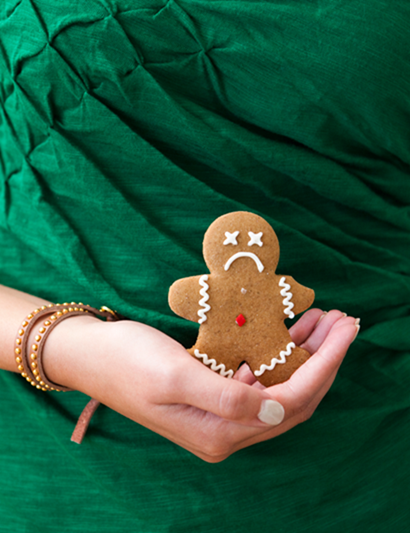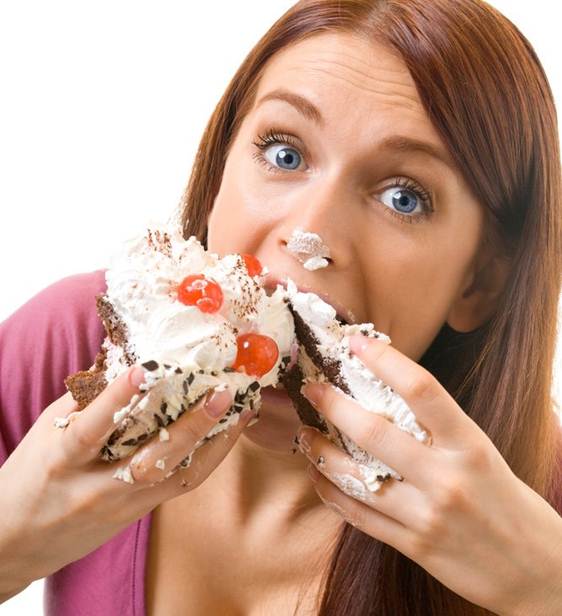It may be hard to swallow, but we discover it’s vital
to acknowledge your eating habits – both good and bad.
You’ve got a great bond with your best
friend, a shaky relationship with your boyfriend and a tense dynamic with your
mum (especially when discussing the aforementioned boyfriend). But where do you
stand with food? Whether you relish every mouthful or count every calorie, your
eating habits aren’t just determined by the contents of your fridge. Read on to
discover what type of ‘eater’ you are – and how to foster a healthier
relationship with your food.

The emotional eater
Stressed? Tearful? If you’re already
reaching for the biscuit tin, you may be an emotional eater. ‘Many people
equate food with pleasure, so they eat to cheer themselves up,’ says
nutritional counselor Susan Marque (www.susanmarque.com).
Doing this occasionally is fine but if you consistently use food as a comfort
crutch, you’re overloading your body. ‘Emotional eaters scoff treats
constantly,’ explains Susan,’ so the digestive system never rests.’ This plays
havoc with your immune system and can cause problems.

Bite back:
‘Before anything can change, you must acknowledge that you’re an emotional
eater,’ says nutritionist Diana C Bright. To break the pattern, it’s important
to think ahead. ‘Try to plan three meals a day and two snacks,’ advises Susan.
This routine will help you emotionally, as well as physically, because you’ll
feel like you’re taking control of your life.’
The overeater
An overeater has issues with portion
control. Perhaps your parents always insisted that you clean your plate, so
you’ve been ‘programmed’ to finish every meal. Or maybe you simply like the
warm, cosy feeling of being a little too satisfied. But you’re probably not
surprised to hear that overeating isn’t good for you. ‘Your stomach becomes
overstuffed,’ says Susan, ‘so it’s impossible for gastric acid to break down
food effectively.’ This leads to digestive problems such as bloating, diarrhea,
wind and stomach cramps.
Bite back:
‘Eat three quarters of every meal and leave the rest,’ recommends Susan. And
listen to your body: a sigh means you should put down your fork. ‘When you’re
full, your stomach pushes against the diaphragm and you sigh,’ Susan says. You
should also chew every mouthful until it’s liquified. Your body will produce
more of the enzyme amylase, which aids digestion. ‘You’ll lose weight, too,’
says Susan, ‘because chewing helps you feel fuller quicker.’
The undereater
One reason for undereating is fear of
putting on weight. Another is a complete lack of interest in food. ‘ Some
people view food merely as a means of survival,’ explains Susan. Dietitian
Amber Isenhart (www.absolutehealthandnutrition.com)
adds that undereaters can have very few hunger cues, or they simply choose to
ignore them. ‘They stop eating before their nutritional needs are met,’ she
says. This can lead to brittle hair, sallow skin, circulation problems and
infertility.
Bite back:
You can’t go from barely eating to enjoying a full roast dinner overnight, so
increase your portions gradually. And to overcome your disinterest in food,
have fun with it! ‘Test out some new recipes, go to new restaurants and
experiment with lots of different flavours,’ suggests Susan. But bear in mind
that it could also be a warning sign of a serious eating disorder. If you are
consistently undereating and have a fear of gaining weight, you should seek
professional medical advice from your GP.
The mindless eater
Ever intended to eat ‘just a hand’ful’ of
Maltesers and then – oops – you’ve finished the whole bag? Research shows that
we make 20 times more decisions about food than we’re aware of everyday. ‘A
mindless eater tends to eat while distracted – say, when watching TV – without
realizing how much they’ve consumed,’ says Amber. This usually happens with
food high in sugar, fat and salt, which are addictive. It can make you feel out
of control, which could lead to emotional eating and its health concerns.
Bite back:
‘Keep a good record,’ suggests Diana. ‘And eat with no distractions, so you can
tune into your feeling of fullness.’ But if you really can’t enjoy EastEnders
without a snack, empty your portion into a bowl so when it’s gone, it’s gone.
When your pancreas is compromised, you crave sweet food, says Susan, which may
be why you’re tempted to binge. Stop these cravings before they start by
stocking up on plenty of fruit and sweet vegetables, such as butternut squash.
The calorie counter
If you’re always focused on counting
calories, you may not stop to consider how healthy you are. ‘People who count
calories are playing a game with themselves,’ says Susan. ‘If they eat junk but
stick to their calorie limit, they think they’ve won. Not true.’ Focusing on
meeting a number rather than maintaining a healthy diet can result in tiredness
and irrational behavior due to low blood sugar levels. Plus, cutting out fat
and salt can lead to fertility problems.
Bite back:
‘Throw out the scales!’ says Susan. ‘Try to focus on feelings of hunger and
fullness rather than numbers. And aim to make nutritionally wise choices
instead of opting for low-calorie varieties. Fill up on fruit, vegetables and
grains so you can feel good about what you eat.’
The forgetful eater
‘Forgetting to eat can usually be put down
to a busy work day or stress,’ says Susan. And when breakfast and lunch have
sailed by, you’ll probably overcompensate for the meals you’ve missed by eating
‘three in one’, making poor choices with quick and unhealthy grub. Your body
isn’t designed for this kind of erratic eating, so weight gain, pancreatic
eating, so weight gain, pancreatic issues and low blood sugar can be a problem.
It can also affect concentration, as the brain won’t be getting the regular hit
of glucose it needs.
Bite back:
‘Set a timer to remind you to eat’, says Susan. ‘And plan ahead. If you’ve got
a busy day tomorrow, make your lunch the night before.’ Diana also suggests
carrying healthy snacks in your handbag, so you can refuel on the go.